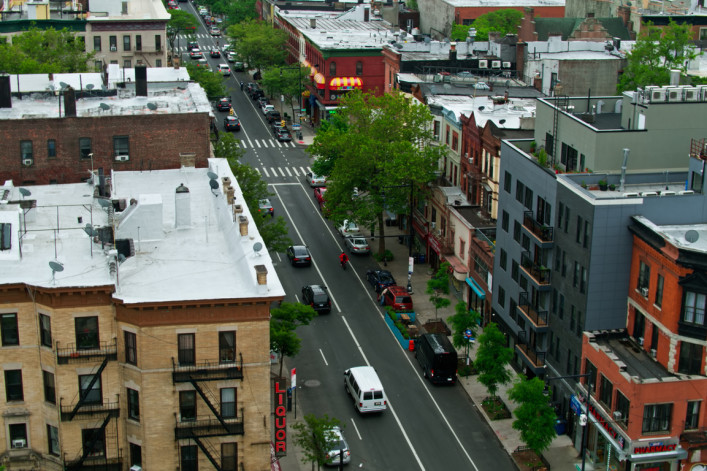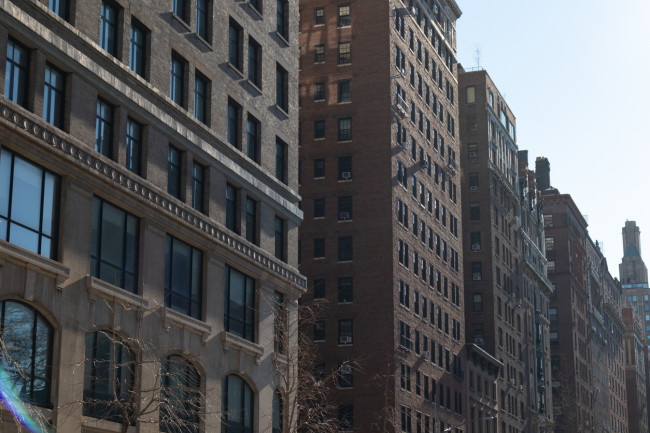Starting over: A divorced dad's honest take on finding a new neighborhood and buying a condo in NYC
- Thanks to the sale of the family apartment, the author had a budget in the $400,000 to $500,000 range
- He spent four months seeing places in Prospect Heights, Ditmas, Prospect Lefferts, and Crown Heights

Once the author was able to let go of unrealistic expectations, he found a place in Crown Heights that worked.
iStock
Newly divorced, a dad in his 40s wanted to buy a place in Brooklyn. Armed with a rough wishlist, and cash from the sale of a three bedroom he shared with his ex, he looked at co-ops and condos in several Brooklyn neighborhoods. Here's what his experience was like, as told to Brick Underground.
Where were you coming from?
Part of the divorce involved selling our biggest asset, a three-bedroom apartment in Boerum Hill, which my ex-wife and I bought in 2006. My ex moved herself and the kids to Peter Cooper Village in Manhattan while I sublet a room in Prospect Heights. We sold the place, and the profit from that sale went into an escrow account until we finalized the terms of the divorce.
Once that happened, I received my portion of the equity, and began looking for a place. I knew I couldn't afford anything in our old neighborhood—it became a lot bougier during our tenure there—especially since I now have a hefty child support payment to make, and I didn't need to get something as spacious, since my kids only stay with me every other weekend. Realistically, I knew I could afford something in the $400s to upper $500s. Those financial limitations helped narrow my search.
Editor's Note: Brick Underground's Inside Stories features first-person accounts of dramatic, real-life New York City real estate experiences. A previous version of the article ran in January 2019. We are presenting it again in case you missed it.]
Why did you decide to buy vs. rent?
I've been an owner since 2006, so I've seen the tax benefits that come from ownership. I also lived through the financial crisis of 2008, when housing prices in NYC didn't really budge all that much. That told me that the general consensus in New York is: If you can afford it, you always buy. Period. It's a great way to generate passive income. I'm not a financial wizard. I don't have time to day trade. This is the only way I know to invest money.
What were you looking for?
In the beginning, I had no idea. I was just looking at what I could afford, and kind of coming up with pros and cons for everything. It was messy. At one point, I thought I wanted to be in a co-op. But then I realized that was a terrible idea. Co-ops often have insanely high maintenance fees, and any improvements had to be approved by the board, which could be run by overbearing jerkoffs. Then I wanted something brand new; it would be such a relief to live in a space where everything works, and there was central heating and cooling.
After a while, I realized the interior space was what mattered the most. I wanted something loft-like. I wanted at least one big open space, and hopefully some kind of outdoor space, but wasn't getting my hopes up that I'd find it. I also was holding out hope I could be within running distance of Prospect Park, where I like to exercise in the warmer months.
How did you search? Did you work with a broker?
I did two things: Searched for places on StreetEasy and Zillow, and talked to a friend of mine who's a real estate agent for advice. He didn't really find anything for me, but he helped me assess places as I found them.
What kind of buildings did you look at?
I looked at a lot of different kinds of places: prewar, brand new, co-ops, Bloomberg-era tax abated places. I liked the prewar stuff a lot, but the spaces were often chopped up into small rooms. The high ceilings and thick walls were appealing, but the rooms would be too small, at least within my price range. Those places would often look stunning when I walked in because they were staged. So initially I'd get excited. But then I'd start looking at how small the rooms actually were, and realize my kids would hate it.
The brand new stuff was just completely overpriced for what you got. Sure, seeing all the new furnishings and central heat/cooling was appealing, but what was advertised as a one bedroom was often a glorified studio. And many of the places weren't in convenient locations for commuting at all. I didn't like the attitude of the agents in those places, either. They seem to all play this kind of snob game, acting like they don't really care whether you like it or not. It could be me: I look kind of unwashed for someone who could afford a place.
What neighborhoods did you look at?
Initially, I looked in Boerum Hill (gave up on that quick), Cobble Hill, Brooklyn Heights, Gowanus—neighborhoods I knew my kids could get to easily, and which they already knew. But the places were either too small, or had some monstrous monthly fee, or were just plain too expensive.
I was kidding myself on what I could afford, and having trouble letting that go. I glanced at Park Slope after that, but didn't really want to live there (culturally, I find that neighborhood irritating). Then I looked in Fort Greene and Clinton Hill, just because I find that area charming and very livable, but those places were sooo expensive for what you get, and Fort Greene Park is too small for the type of running I like to do.
Finally, I realized my best bet was either Prospect Heights, Ditmas, Prospect Lefferts, or Crown Heights. They were on the less popular side of Prospect Park (or so I thought), and there was a good mix of places I could afford. Prospect Heights became my favorite choice after awhile.
Was transportation a consideration?
Yes. But more in the sense that there doesn't seem to be any political will to overhaul the subway system. The subway system has really deeply embedded long-term issues that aren't getting solved anytime soon.
I dismissed living along the L train early, mainly because I already work in Williamsburg, and didn't want to live along the Millennial Party Corridor. I wanted to live in a real neighborhood. Greenpoint is more of a real neighborhood, but Prospect Park is so much better as a park than McCarren, in my opinion. Also, the L and G train stops aren't even that close to my office. It's still a 10-15 minute walk once you get out. I primarily drive to work, which is terrible, but a ton more efficient than the train, ironically. This is because I live and work in Brooklyn.
What time of year did you look?
I started looking in the summer, which people say is a slow season, because buyers with money are all out of town, so in theory sellers are holding back their places to sell until everyone is back in town. But when fall hit I was still looking, and I didn't notice any dramatic uptick in inventory.
With the rise of interest rates, and the forecast of a coming recession, it feels like the market has been cooling for some months. But it's New York. From my experience. New York doesn't operate like the rest of the country. If anything, I'd say that's affected rentals more. Sellers don't want to cut prices . They'll just hold. Open houses were crowded for the new places being presented.
I saw a really nice complex in Ditmas I really liked but decided that it ultimately was too far away from work for me. That one had tons of people. The places in the fancier neighborhoods felt kind of dead, actually. The new places were definitely getting more attention. I didn't encounter any other divorced guys in their 40s. Mostly young couples in their 30s, some in their late 20s.
How many places did you look at?
I looked at about a dozen. It took me about four months. I vacillated between being hyper-focused, and getting kind of depressed about how expensive everything was and ignoring the market altogether. It was an emotional roller coaster. I was downsizing from my previous life by a fair margin, and that took some time to contend with emotionally.
How did you ultimately choose your new apartment?
When I finally saw the place I would ultimately buy, I had a fairly realistic idea of what I could afford, and what I actually wanted. I knew I wanted a big open space. I knew I wanted to be somewhat close to Prospect Park. I knew it couldn't be too small. I knew it didn't have to be in a legacy neighborhood (I'd let that go). When I walked in, the place was just a blank box. They hadn't staged it at all. I knew that was contributing to why it was slow to sell. So I felt like for the first time I was looking at something that might actually be a little undervalued.
It was three blocks from a subway (the Nostrand A, C, and E) and two blocks from an LIRR stop. The living room was HUGE. And the place stretched across both sides of the condo complex, so you had a light on both ends. It had a really big covered outdoor deck, by New York standards. And it had a deeded parking space. And free laundry in the building. And central heating/air. And a free gym. And a storage unit. Tons of amenities. The parking space alone is worth its weight in gold.
But yeah, if you walked into the place knowing nothing, and compared it to other places, I could see why first time buyers wouldn't like it. It didn't have any character. The kitchen counter space is tiny. The epoxy floors feel a little hospital-like. It can be hard to envision a homey space. And it sits on kind of the outer ring of Crown Heights, near the Atlantic Avenue side. People could look out the bedroom window, and see a train going by, they see Atlantic Avenue, and think NOISE. The block has a fair amount of trash blowing around. There's a subsidized housing complex a block and a half away. It feels a little like "Edgetown."
But what I saw was a neighborhood on the rise. I could see the hipster coffee shop near the train, the fancy grocery across the street. Gentrification was happening fast. This neighborhood was going to continue its upward mobility, in my opinion. My kids were through elementary school, so districting didn't matter anymore. It felt like a solid investment. Also: the building, which was built 10 years ago, had a tax abatement, so common charges are relatively low.
From the look of it, the condo felt solid. I couldn't see weird signs of wear and tear like on some of the newer places built with cheap materials. It looked like it had good bones. I didn't care they hadn't staged it. I'd been through that song and dance. I knew at that point that space mattered. Square footage. And a box was way more preferable to the kind of cut up strange layouts I'd encountered. I knew it would be easier to find furniture to fit within it. Each room was big enough to serve multiple purposes. The base was good. I work off what I'd call informed instinct, and my instinct after just a minute was, "This is it. Move fast."
Did you pay asking? Negotiate?
I bid $30,000 less and eventually got to $15,000 less. I knew it had been on the market for a bit, so I was in the pole position. Maybe I should have been more aggressive, but I really wanted it.
What was financing process like? How did you find a mortgage broker?
Wow. That was a completely different experience from 2006. I figured having been a homeowner already for 12 years would have helped simplify this part, but instead, it was way more onerous. The main issue was my child support. It's substantial, and the lenders dinged me for it. One of the bitter ironies of getting a mortgage in America: the less money you have available, the more you end up paying a bank to have one.
Initially, I had reached out to my bank, and they offered me this crazy low interest rate, saying I wouldn't even have to declare that I paid child support. But that ended up being total bullshit. And once I did declare it, the terms offered for a mortgage weren't nearly as good. Still pretty good, because my credit is 800+, but nothing close to the initial estimate. I had to explain every major financial transaction of the last three years. I had to get letters from my ex-wife explaining that the checking account in both of our names was solely mine now. I had to get proof of every single thing they could think of. The sweat equity was so frustrating, I had a couple of small breakdowns with my mortgage broker as a result. But he patiently walked me through it. I found my broker through my agent, who is also a friend.
My real estate lawyer was a gem. She works out of a firm in Chinatown for a really reasonable rate. Came through my agent friend. It turned out that the parking space didn't have a real deed attached to it (fraud!), and she was able to get the original sponsor to fashion one, thank god. That was a last-minute freakout that I'd just as soon never go through again.
What was closing like?
I closed over the holidays and wasn't present. I gave power of attorney to my lawyer. The closing date kept creeping closer to the holiday season, and the window of my loan ended January 2nd, so it had to happen while I was out of town. It worked out fine.
Any final thoughts on buying again in NYC?
It was a lot trickier, given my life circumstance, but ultimately empowering. I felt like I solved a complex math problem that at first I couldn't really comprehend, and had to teach myself how to navigate the landscape as I went. Once I was able to let go of the fantasy of what I wanted, and be more realistic, that's when things started to really progress. I'm very happy with how it turned out.
You Might Also Like


























